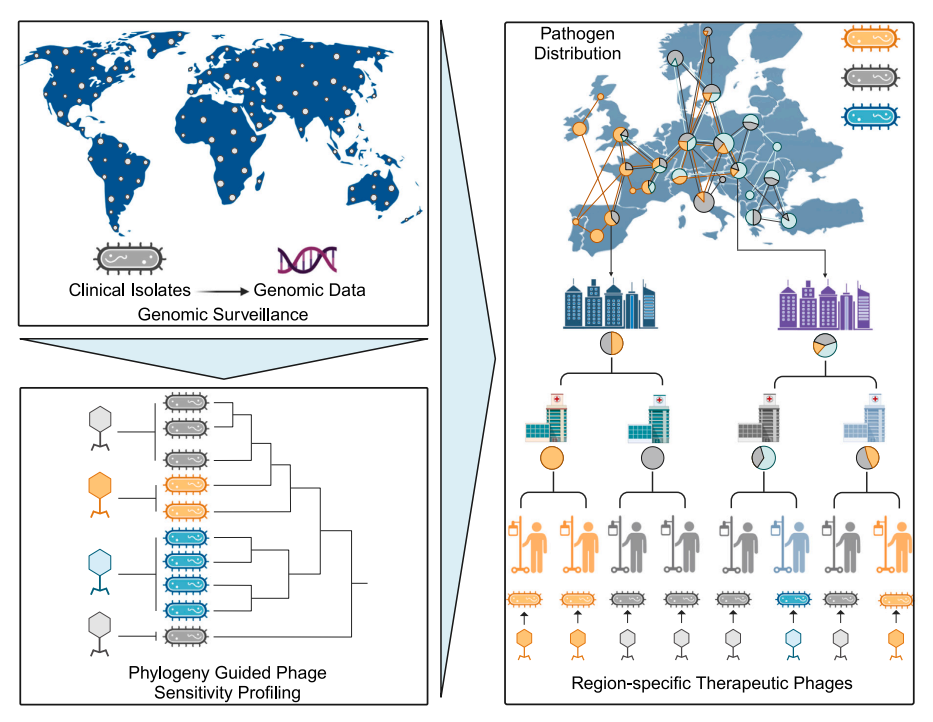Combatting Antibiotic Resistance: Global Superbug Map Supports Phage Therapy Development
A new global "superbug map" has been developed to track the spread of Acinetobacter baumannii, a critically antibiotic-resistant species often found in hospitals. This map, published in Cell, was created by scientists at the HUN-REN Biological Research Centre in Szeged, Hungary. By mapping the strain types of this pathogen, the research aims to improve the deployment of bacteriophage (phage) therapies, which can be used as an alternative to antibiotics for infections that no longer respond to conventional treatments.
The analysis covered more than 15,000 Acinetobacter baumannii genomes collected worldwide. Findings revealed that a few strain types dominate local infections and that these strains persist for around six years. This offers hospitals a timeframe to apply pre-emptive phage therapies targeting specific strains, with the potential to treat up to 80% of infections in a region.
Balint Kintses, lead author of the study and Group Leader at the Laboratory of Translational Microbiology, explained:
"Phages present a promising alternative or complementary therapy to combat hospital-acquired antibiotic-resistant infections, especially where conventional antibiotics fail."
The study highlights that phages, which target specific bacterial strains, can be pre-prepared based on the dominant strains circulating in specific regions, reducing the time needed for treatment in acute cases where patients may only have days to live.
The mapping of these strains also shows that despite geographic diversity, the strain composition within a country remains stable for six years. This timeframe allows for strategic development of region-specific phage cocktails, a collection of phages that target the most common bacterial strains in a region.

A pathogen genomic surveillance framework to inform precision phage therapy
(Source: Koncz, Mihály et al.)
Balázs Papp, a co-researcher in the study, further emphasized the global impact:
"This framework provides a map and a compass for scaling phage therapy, supporting collaborations worldwide and streamlining clinical trials."
The team's efforts contribute to advancing precision medicine in the context of antibiotic resistance. With 80% of Acinetobacter baumannii genomes displaying resistance to carbapenem, a last-resort antibiotic, alternative treatments such as phage therapy are increasingly relevant. Researchers demonstrated that genomic surveillance, combined with phage therapy, could be applied to target prevalent bacterial strains across large regions like Eastern Europe, where phage cocktails were able to address the dominant strains.
The team employed a methodical approach to isolate phages from wastewater and test them against these prevalent strains. Their findings indicated that 95% of infections could potentially be treated using these phages. In the case of the most common strain, ST2-KL3, phages were effective in lab and animal models, presenting a potential option for future clinical treatments.
This research outlines a scalable method for addressing antibiotic-resistant infections and provides a foundation for the possible expansion of phage therapy applications. By translating these results into treatments, healthcare providers may have an additional tool for managing infections that are resistant to conventional antibiotics.
Key Takeaways from the Study:
- Genomic surveillance of over 15,000 cases revealed that dominant Acinetobacter baumannii strains remain stable for around six years.
- Phage cocktails targeting the most common strains in a region can be prepared in advance, addressing up to 80% of local infections.
- Researchers isolated 15 phages capable of targeting the most prevalent strains in Eastern Europe, covering 90% of the local bacterial diversity.
- Phage cocktails were validated in lab and animal models, showing promise in combating resistant infections and reducing the development of phage resistance.
Topics: Biotech